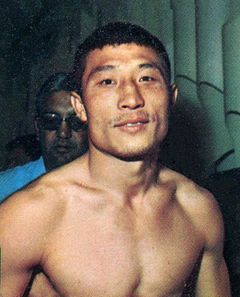Ki-Soo Kim

Kim Ki-soo c. 1968
|
||||||||||
| Personal information | ||||||||||
|---|---|---|---|---|---|---|---|---|---|---|
| Born |
17 September 1939 Pukchong, South Hamgyong, Korea (today in North Korea) |
|||||||||
| Died | 10 June 1997 (aged 57) Seoul, South Korea |
|||||||||
| Height | 1.71 m (5 ft 7 in) | |||||||||
| Weight | 67 kg (148 lb) | |||||||||
| Korean name | ||||||||||
| Hangul | 김기수 | |||||||||
| Hanja | 金基洙 | |||||||||
| Revised Romanization | Gim Gi-su | |||||||||
| McCune–Reischauer | Kim Kisu | |||||||||
| Sport | ||||||||||
| Sport | Boxing | |||||||||
|
Medal record
|
||||||||||
Kim Ki-soo (17 September 1939 – 10 June 1997) was a South Korean southpaw boxer at middleweight. He was South Korea's first world boxing champion.
Kim graduated from Kyung Hee University's College of Physical Education. He competed in boxing at the 1958 Asian Games in Tokyo, where he earned the gold medal of the welterweight division by defeating Soren Pirjanian of Iran, on points, in the final. He went on to represent South Korea as a welterweight at the 1960 Rome Olympic Games, where he defeated Henry Perry (Ireland) on points, but then lost to Nino Benvenuti (Italy) on points.
Kim turned professional in 1961 and captured the WBC, WBA and Lineal light middleweight title when he upset Nino Benvenuti by split decision in 1966. He defended the belt twice before losing it to Sandro Mazzinghi in 1968 by split decision. He retired the following year.
After his retirement, Kim worked as a boxing coach. He later started his own company, and was successful in business. He died of liver cancer on 10 June 1997, at the age of 57. He was survived by his wife Jeong Ha-ja (鄭夏子), two sons, and two daughters.
...
Wikipedia
